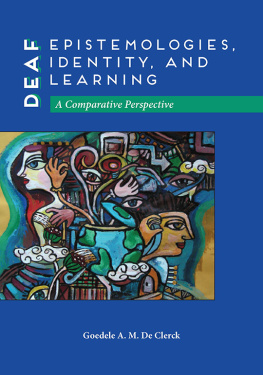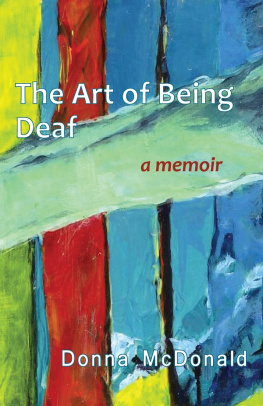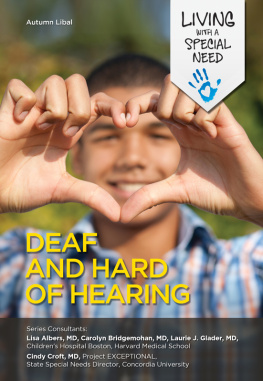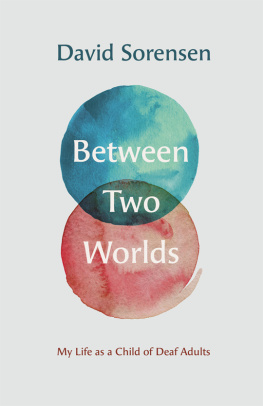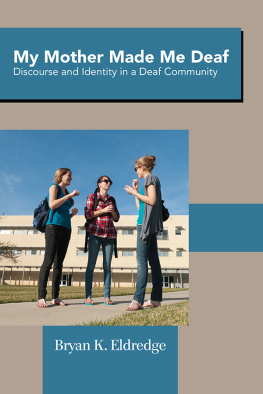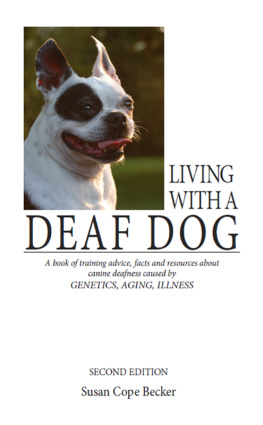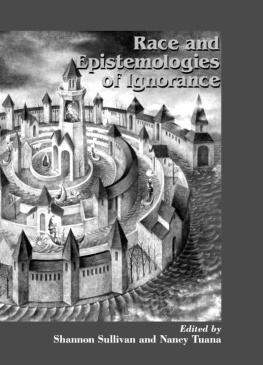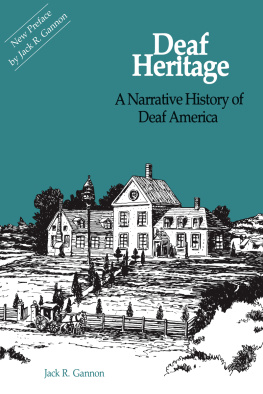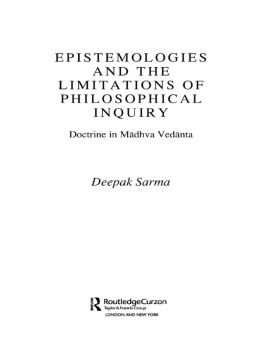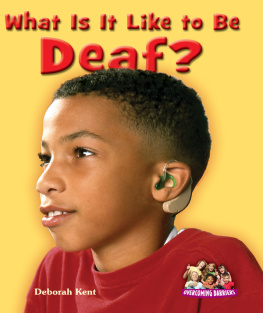Goedele A. M. De Clerck - Deaf Epistemologies, Identity, and Learning
Here you can read online Goedele A. M. De Clerck - Deaf Epistemologies, Identity, and Learning full text of the book (entire story) in english for free. Download pdf and epub, get meaning, cover and reviews about this ebook. year: 2016, publisher: Gallaudet University Press, genre: Home and family. Description of the work, (preface) as well as reviews are available. Best literature library LitArk.com created for fans of good reading and offers a wide selection of genres:
Romance novel
Science fiction
Adventure
Detective
Science
History
Home and family
Prose
Art
Politics
Computer
Non-fiction
Religion
Business
Children
Humor
Choose a favorite category and find really read worthwhile books. Enjoy immersion in the world of imagination, feel the emotions of the characters or learn something new for yourself, make an fascinating discovery.
- Book:Deaf Epistemologies, Identity, and Learning
- Author:
- Publisher:Gallaudet University Press
- Genre:
- Year:2016
- Rating:4 / 5
- Favourites:Add to favourites
- Your mark:
- 80
- 1
- 2
- 3
- 4
- 5
Deaf Epistemologies, Identity, and Learning: summary, description and annotation
We offer to read an annotation, description, summary or preface (depends on what the author of the book "Deaf Epistemologies, Identity, and Learning" wrote himself). If you haven't found the necessary information about the book — write in the comments, we will try to find it.
Deaf Epistemologies, Identity, and Learning — read online for free the complete book (whole text) full work
Below is the text of the book, divided by pages. System saving the place of the last page read, allows you to conveniently read the book "Deaf Epistemologies, Identity, and Learning" online for free, without having to search again every time where you left off. Put a bookmark, and you can go to the page where you finished reading at any time.
Font size:
Interval:
Bookmark:

Deaf Epistemologies, Identity, and Learning
Deaf Epistemologies, Identity, and Learning
A Comparative Perspective
Goedele A. M. De Clerck
Gallaudet University Press
Washington, DC
Gallaudet University Press
Washington, DC 20002
http://gupress.gallaudet.edu
2016 by Gallaudet University
All rights reserved. Published 2016
Printed in the United States of America
Library of Congress Cataloging-in-Publication Data
Names: De Clerck, Goedele, author.
Title: Deaf epistemologies, identity, and learning : a comparative perspective/Goedele A. M. De Clerck.
Description: Washington : Gallaudet University Press, 2016. | Series: Deaf education series ; 5
Identifiers: LCCN 2016029289|
ISBN 9781563686702 (hardback) |
ISBN 9781563686719 (e-book)
Subjects: LCSH: Deaf--Education--Cross-cultural studies. | Deaf--Services for--Cross-cultural studies. | Identity (Psychology) | BISAC: EDUCATION / Special Education / General.
Classification: LCC HV2430 .D4 2016 | DDC 305.9/082--dc23
LC record available at https://lccn.loc.gov/2016029289
This paper meets the requirements of ANSI/NISO Z39.48-1992 (Permanence of Paper).
Cover painting by Jiayi Zhou.
This book is the result of ethnographic research with deaf communities, and the methodologies of the case studies presented herein are discussed in their respective chapters. Their central feature is the cultural practices of signed storytelling that have been intergenerationally transmitted in deaf communities around the world for as long as they have existed. These practices are at the core of an anthropology of deaf flourishing, and thus life stories have been a major resource in all my research settings. In Flanders, Uganda, and Cameroon, I have also explored creative sources of collective storytelling, such as meetings, discussion groups, citizenship platforms, dance, and performance. In conducting this research, I have adopted a community-based approach through cooperation with local, national, and international deaf organizations.
The first section of this book (Chapters presents a theoretical framework for the dynamics of deaf identity and emancipation, which are viewed as learning processes set against the background of global-local interactions. Deaf culture, identity, and community development appear as complex, situated, and dynamic progressions, conceptualizations of the predicament of human diversity. I explore an inclusive approach, generating a culturally sensitive line in deaf studies.
In the second section of the book (Chapters explores an incipient emancipation process in a non-Western context (i.e., Cameroon), which, until 2010, had not experienced any transnational exposure.
These case studies also illuminate the creation of sign language spaces and how they expedite learning; understanding the notion of deaf identity as a learning process is a core theme of the book (also see ). The Flemish case concentrates on the role of transnational contact in emancipatory knowledge transfer and empowerment by deaf role models in barrier-minimizing environments. Gallaudet University, a setting perceived by international deaf people as a deaf space (Gulliver, 2006), provides further insight into informal peer education and complex identity formation in a transnational zone of proximal development. The Cameroonian study focuses on indigenous linguistic, cultural, and learning practices and the recent awakening in a community that has not yet engaged in collective advocacy, but may be inspired by international human rights workshops and by exchange with examples of good practices in Uganda.
In this books third section (Chapters , which explores tensions in contemporary trajectories toward emancipation and identity that can be distilled from Flemish deaf narratives. This storytelling reveals the creation of spaces in between (also see Hoegaerts & De Clerck, in press; for betweenity see Brueggemann, 2009); and an epistemological-ontological shift toward becoming. Arguing that cross-pollination with alternative notions of citizenship is necessary for open-ended and inclusive processes of emancipation, I introduce a stance of post-identity through the concept of nomadic citizenship (Braidotti, 2011). This generates affirmative power for telling fresh narratives in an alternative and dynamic approach toward the quest for deaf identity that enables multiple affiliations and forms of belonging. Telling ones story, in a dialogical mode and in interaction with deaf cultural resources, changes collective accounts of heritage and origin, opening up new and exciting pathways.
In ).
Reflecting on my position as a deaf scholar in different communities and my challenges as the first deaf person to defend a doctorate in sign language in Flanders, where deaf studies is somewhat circumscribed institutionally, I have come to understand that wisdom plays a role in deaf empowerment and that the building of this wisdom is a fascinating subject in itself. My reflection, informed in large part by interdisciplinary discussions, has resulted in refining concepts of an anthropology of flourishing and a strength-centered ethnography.
How can we, as human beings, connect in deaf flourishing and nurture it sustainably? This question is discussed in , the final chapter, from a perspective of knowledge co-production in transnational interactions in Cameroon. These interactions include the WFDs Human Rights and Capacity Building Training in Yaounde, and the 2nd Sign Language Workshop at the 7th World Congress of African Linguistics in Buea. The chapter highlights indigenous and hybrid notions of deaf flourishing that emerge from the wild (i.e., occur spontaneously in daily interaction) and the epistemic processes involved in their formation. These processes reveal a complex and novel blending of indigenous, expert, individual, and collective knowledge that will need to be valorized in the fields of deaf studies, education, and development to enable deaf people to live up to their full potential. My goal throughout this book is to look through an interdisciplinary lens to critically explore empowerment in settings of daily life, research, leadership, and community development. Through this lens, I have formulated a framework of deaf flourishingand of connecting in deaf flourishing in particular. Entangled in the emotional geographies and trajectories of modernity and postmodernity, sign language communities can generate room for alternative worldviews and pathways toward fruitful futures.
This book represents the incredible expertise of several treasured groups and individuals. The remarkable assistance and encouragement they have provided to this work has exceeded all my expectations many times over.
Firstly, I wish to warmheartedly thank all the research participants who generously shared their experiences and narrated their life stories, including deaf community members in Flanders, Cameroon, and Uganda and international deaf people at Gallaudet University in the United States. This book could not have been written without your exceptional effort across the past ten years. I have felt honored to listen to your stories, and I have learned enough from you to fill many more volumes. Being written in all these places and completed in the United Kingdom, where I am currently working with deaf migrants and British deaf people, this book already travelled a lot before it was in print. I hope that it will continue to travel and evolve through further research and discussion, as a resource inspiring and contributing to deaf peoples emancipation and empowerment.
Font size:
Interval:
Bookmark:
Similar books «Deaf Epistemologies, Identity, and Learning»
Look at similar books to Deaf Epistemologies, Identity, and Learning. We have selected literature similar in name and meaning in the hope of providing readers with more options to find new, interesting, not yet read works.
Discussion, reviews of the book Deaf Epistemologies, Identity, and Learning and just readers' own opinions. Leave your comments, write what you think about the work, its meaning or the main characters. Specify what exactly you liked and what you didn't like, and why you think so.

